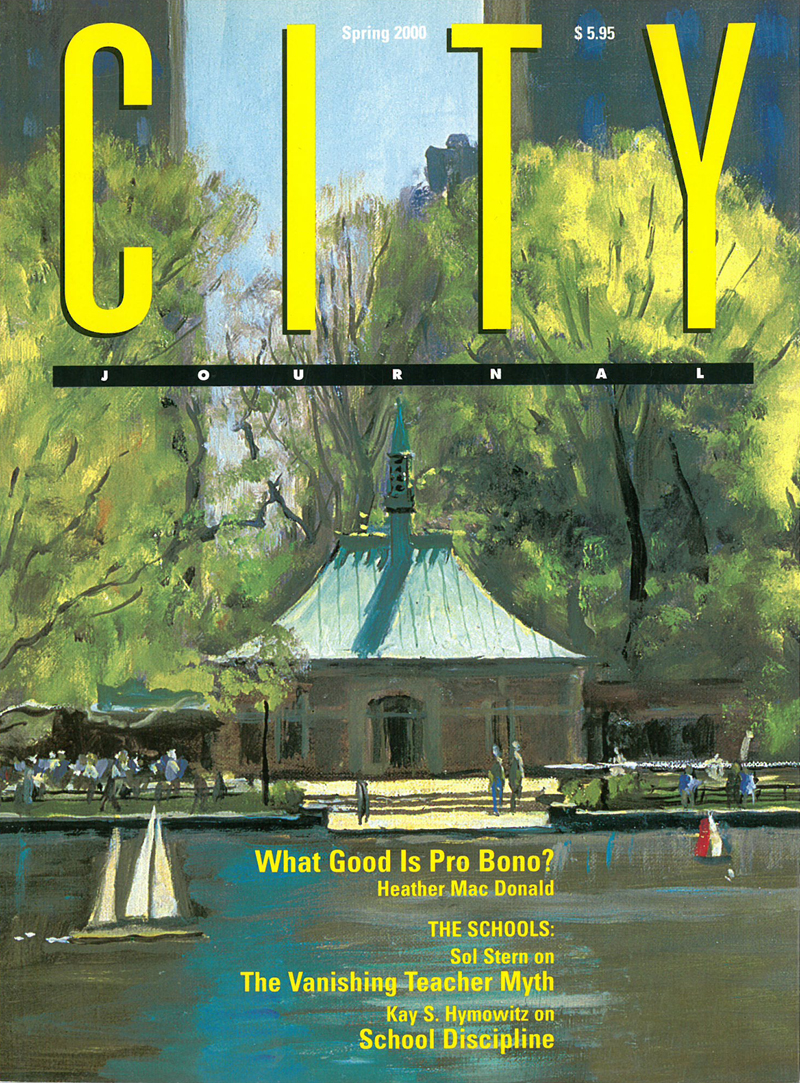Pro bono publico: it’s a phrase that makes you stand up straight and puff out your chest, its alliteration and internal rhymes making it ring like poetry, its noble republican sentiment calling up images of togas, laurel wreaths, and sun-splashed columns. So it’s a little disillusioning to learn from Heather Mac Donald’s “What Good Is Pro Bono?” that this long, honorable tradition of the legal profession has largely turned into a racket. Pro bono used to mean that lawyers would provide unpaid services to promote the smooth administration of justice and to make sure that the poor had access to the courts and to justice. Today, instead of advancing some broadly accepted vision of the public good, pro bono lawyering has become a mechanism by which million-dollar attorneys promote their own left-wing charitable causes and make the public foot the bill. For pro bono practice isn’t even free anymore: the lawyers who do it all too often end up sticking the taxpayers with the costs.
Our story’s account of this transformation of pro bono, and of the legal profession along with it, is the latest in a continuing City Journal series in which Mac Donald has traced how the cultural revolution of the 1960s seeped into every capillary of America’s elite institutions, from the law schools and great charitable foundations to the schools of public health and even the New York Times’s annual neediest cases appeal. All told, it is an extraordinary chronicle of how the ideas of an elite few—ideas about the causes of poverty, about personal responsibility, about the role of government, about human nature and human dignity—flowed almost instantaneously out of the ivory tower into the whole of American society because they had so quickly and completely won over the agencies that shape and transmit culture. When Wall Street lawyers start putting into practice theories that a few years earlier existed only in the minds of a few wild-eyed academics, the real-world consequences are bound to be sweeping.
Finally, a reason to check your email.
Sign up for our free newsletter today.
How sweeping? Kay S. Hymowitz’s “Who Killed School Discipline?” gives one answer to that question. Pro bono litigation on behalf of pupils challenging the disciplinary actions of teachers and principals went far toward subverting the authority—including the moral authority—of school officials. The result: disorderly schools, bristling with lawyer-devised bureaucratic procedures and pop-psychology behavior-control gimmicks that fail to keep students under control and, worse, fail to create the community of value that once not only kept schools orderly but also made them molders of citizens.
Lawyers produced these results doubtless with good intentions, believing that they were sparking a new era of freedom. But with their narrow focus on abstract rights, it never occurred to them that human communities operate according to certain realities of human nature. They never dreamed that they could be damaging a layer of human value even deeper than constitutional rights. In this, they were proceeding as so many statesmen and social commentators proceed: looking only at political or legal structures without considering how they enhance or deform the raw human material. For social commentators, it takes great insight not to fall into this error, as Theodore Dalrymple explains in “How to Read a Society.” What makes a pair of nineteenth-century French aristocratic writers, Astolphe de Custine and Alexis de Tocqueville, such lastingly great social analysts, Dalrymple shows, is their continuous attentiveness to the interplay of political regimes, human nature, and individual consciousness—an attentiveness modern commentators and statesmen would profit by adopting.
The transformation of pro bono lawyering that led to these social changes began with changes in the culture. Two further stories in this issue investigate what is happening on the cultural frontiers today. It’s a mixed—and therefore hopeful—picture. “Bring Back Sportsmanship” by Brian C. Anderson and Peter Reinharz shows how the destructive forces of the sixties’ cultural revolution have debased professional and schoolboy sports, often making them celebrations of thuggery instead of sportsmanship both on and off the field. But as Stefan Kanfer explains in “Good Literature Lives!,” authors Patrick O’Brian and J.K. Rowling, with their beautiful prose and elevated moral vision, have kept literature very much alive, and millions of readers have responded enthusiastically. So the material for cultural renewal—pro bono publico—is at hand.
